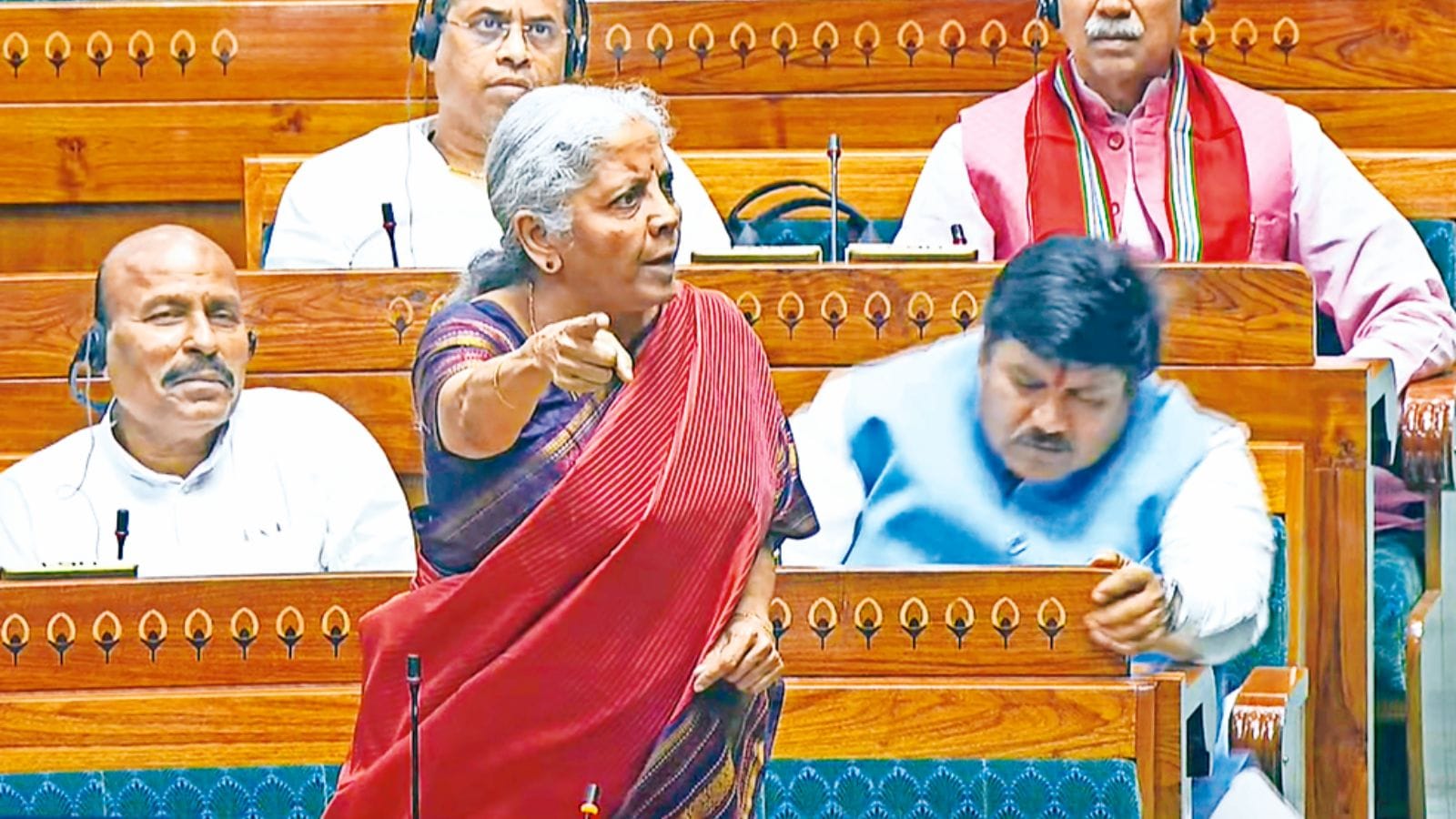Digital record will help track unaccounted money: Sitharaman
LS passes Finance Bill, new I-T Bill to be taken up in Monsoon Session
 Sitharaman said the Finance Bill provides unprecedented tax relief, and the 13.14% projected growth in personal income tax collection is "realistic" and supported by solid data. (Sansad TV via PTI Photo)
Sitharaman said the Finance Bill provides unprecedented tax relief, and the 13.14% projected growth in personal income tax collection is "realistic" and supported by solid data. (Sansad TV via PTI Photo)The new Income Tax Bill will be taken up for discussion in the Monsoon Session of Parliament, Finance Minister Nirmala Sitharaman said on Tuesday.
Replying to the discussions on the Finance Bill, 2025 in the Lok Sabha, Sitharaman said the new I-T Bill, which was introduced in the House on February 13, is currently being vetted by the Select Committee.
The committee has been mandated to submit its report by the first day of the next session of Parliament, said the minister. “…we will take it (new Income Tax Bill) up in the monsoon session,” Sitharaman said.
She said the digital record will also be taken into account for the assessment once the new I-T Bill is passed.
On the Opposition’s concern that certain provisions in the new I-T Bill breach taxpayers’ privacy, the Finance Minister said scanning Google map history, WhatsApp chats and Instagram accounts has helped the government track unaccounted money. She said the provision to look into data exists in the current environment too, particularly in cases of search and seizure authorised by competent authorities where access code is not available and the person concerned is not cooperating with the proceedings.
The new Bill gives tax officers powers to override the access code of computer systems and virtual digital space, including online trading and investment accounts as well as cloud servers, in search and seizure cases.
Sitharaman said it was being specifically mentioned in the new Bill because the 1961 Income Tax Act permitted examination of books of account physically kept, and every manual record of the person’s income and expenditure.
Since the 1961 Act does not mention the “digital”, most often it becomes contentious and people go to the court and seek protection from not sharing passcode, she said.
“So, digital becomes an issue… That gap is getting filled up in the new Income Tax Bill which is before the select committee,” the minister said.
Explaining why digital record has to be brought in, Sitharaman said unaccounted money to the extent of `250 crore has been detected after decoding encrypted messages in mobile phones.
She said Instagram accounts were also used to establish the beneficial ownership of expensive vehicles and crack cases of benami properties.
The minister said Google map history found on the phone was used to determine the frequented locations of individuals and that enabled detection of hideouts where cash and unaccounted transactions were kept. She said there was a need to change or add the digital elements into the Act itself.
Sitharaman said the tax department carried out a “nudge” campaign, asking taxpayers to voluntarily disclose their foreign income and assets. There is an agreement globally to share information by which the government receives a bulk of information on Indian accounts being held outside.
“We nudged the taxpayer to voluntarily disclose their foreign income and assets. SMS and emails were sent to around 19,501 select taxpayers asking them to review their income tax returns filed for 2024-25 based on the information available on the income tax about their foreign deposits,” the minister said. As a result of that campaign, a total of 11,162 taxpayers revised their returns and filled scheduled foreign assets forms and declared total assets of `11,259.29 crore, disclosing foreign income of `154.42 crore. Also, 883 taxpayers reviewed their IT returns and corrected their status from resident to non-resident, said the minister.
“Cumulatively, this simple nudge has resulted in declaration of foreign assets worth `29,208 crore and foreign income up to `1,089 crore by 30,161 taxpayers,” she said.
The minister said the Opposition’s allegation that GST is not progressive is “absolutely unfounded”. “I highlight how… the wealthiest 20% of Indians contribute 41.4% of household GST and 14.2% of total GST. While the bottom 50% contributes just 28% of the household GST and 9.6% of total GST. So this argument that it is not progressive is not right at all. The poorest 50% face an average effective GST rate of 7.3% only,” the minister said, adding that under the pre-GST regime, the average indirect tax rate was around 15 % whereas as of March 2023, after the GST was introduced, the average GST rate was just 12.2%.
The Lok Sabha later passed the Finance Bill 2025, along with various amendments moved by the government. The amendments proposed by two Opposition members were rejected through voice vote.
Sitharaman said the Finance Bill provides unprecedented tax relief, and the 13.14% projected growth in personal income tax collection is “realistic” and supported by solid data.
About an amendment regarding the abolition of 6% equalisation levy on online advertisements, she said it was done to address “uncertainty in international economic conditions”.
Talking about customs tariff rationalisation, the Minister said the Union Budget aims to boost domestic production and enhance export competitiveness by reducing duties on raw materials and inputs, making domestic products more cost-effective.
(With PTI inputs)







